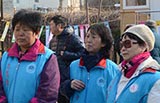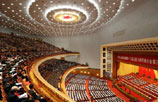No choice except to blow it up?
(chinadaily.com.cn) Updated: 2012-06-06 21:19Shenyang Green Island Sports Center in Shenyang city, Lioaning province, was demolished on June 3 after being used for less than 10 years.
The indoor football stadium, the largest of its kind in Asia, cost about 800 million yuan ($127 million) to build. It was reduced to a pile of debris in a few seconds.
Local media reported the stadium was demolished because it was seldom used and occupied land set aside for commercial real estate. The local district government said on June 2 that a private company had invested in the sports center and that its construction did not meet specific standards, causing it to be little used.
To ensure that the land the center stood on can be properly used and developed, the government decided to expropriate it after the demolition.
Five years ago, the famous Wulihe Stadium, at which the Chinese national soccer team won its first and only entry into the World Cup, was blown up and replaced by a commercial real estate project, despite the strong opposition to those plans expressed by soccer fans throughout the country.
No matter if the Green Island Sports Center was privately owned or had received investments from the government, it was always a public stadium in the eyes of local residents.
Why are such buildings always sacrificed to commercial projects? It is by no means an accident that Wulihe Stadium and Green Island Sports Center both fell to the wrecking ball within 5 years of each other. To some extent, these demolitions are the results of local governments’ excessive reliance on revenue derived from land transfers.
Public structures are gradually nibbled up by commercial projects. This is not only a shortsighted waste of money but also reflects local governments’ ingrained tendency to favor real estate projects and ignore the public interest.
In the past five years, the real estate industry has developed quickly. Most of the land in downtown Shenyang has been occupied, only leaving opportunities in the suburbs for developers. The demolition of the city’s two sports stadiums coincided with a quickening in the pace of the local real estate industry’s expansion.
Sadly, stadiums and similar places are just what the public needs now. The Green Island Stadium in the suburbs was in an inconvenient place, one that local residents had difficulty getting to. That, though, was not a flaw in the stadium itself, only a mistake made by those who planned its construction.
Before demolishing it, the local government should have thought about whether a marketing campaign or similar steps could have led to the stadium being better used. As the city becomes bigger and bigger, the stadium might have been encircled by residential communities. Its commercial and public value would have dwarfed the income that could be obtained over the long run from land transfers.
It really was a pity to see such a new stadium disappearing in seconds under a cloud of dust.
Local governments and real estate developers may gain benefits from demolishing similar projects. But such actions waste materials and resources and cause decision-makers to lose credibility. These sorts of development methods, founded as they are on bubbling land prices and inflated land financing, cannot be sustained for long. (Beijing News)
- Cult leader faces criminal prosecution
- Wan Li, ex-head of NPC, dies at 99
- Govt office moves planned to relieve capital's congestion
- Medical attacks remain a problem
- 9 foreigners detained over banned videos
- 12 arrested on suspicion of selling drugs overseas
- China's student loan payback period extended to 20 years
- Graft fight gains international support
- Ministry of education acts to eliminate 'toxic school uniforms'
- Ox stomach voted most popular hot pot dish in Chongqing







